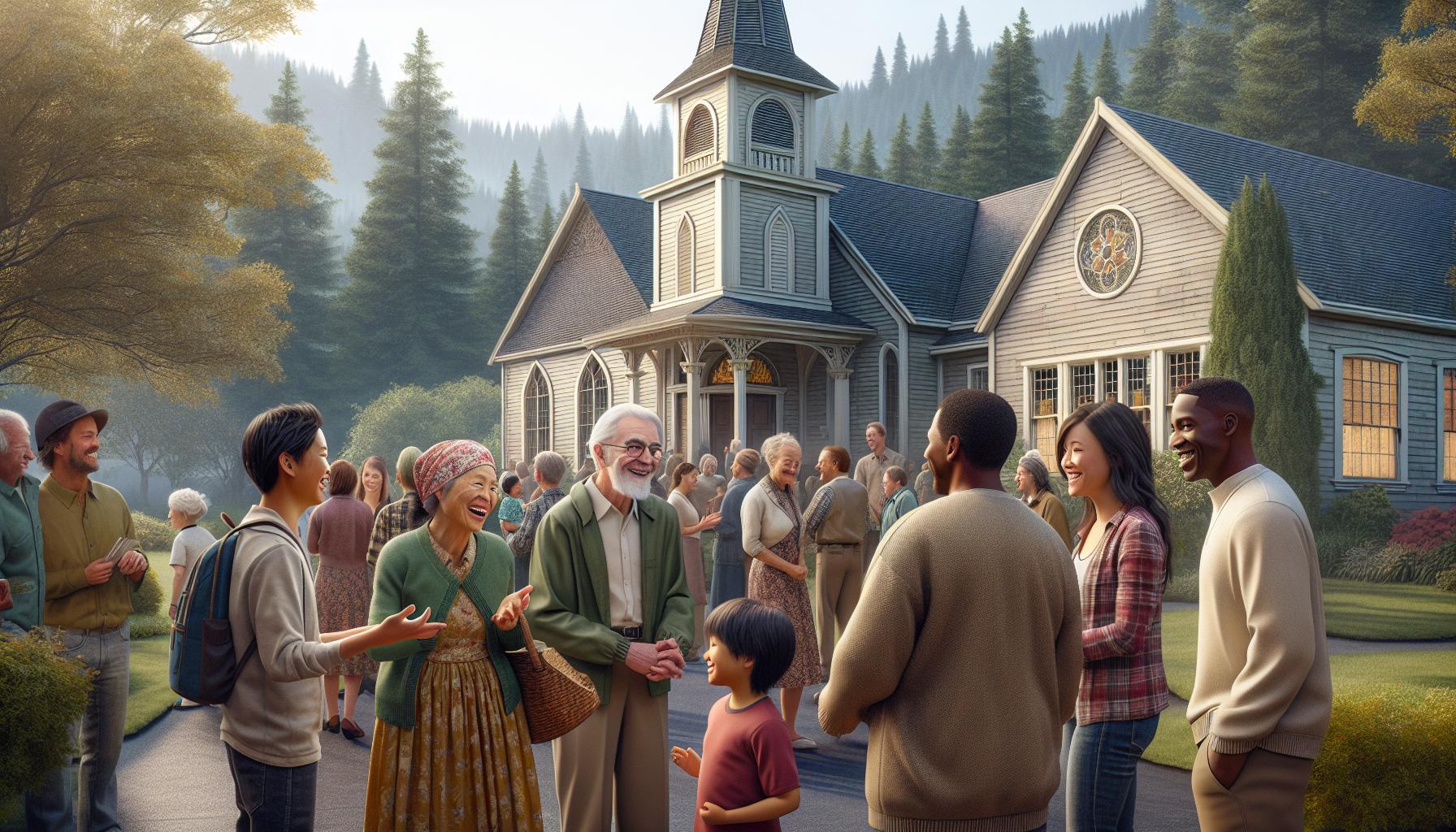Wandering through Issaquah, I’m always struck by the vibrant sense of community that seems to pulse through this charming town. Nestled in the foothills of the Cascades, Issaquah’s churches stand as pillars of faith and fellowship, weaving a rich tapestry of support and connection among its residents. Whether it’s through Sunday services, community outreach programs, or simply offering a warm place for reflection, these churches play an integral role in shaping the town’s spirit.
In a world where it’s easy to feel disconnected, the churches in Issaquah remind us of the power of coming together. They provide a space where people from all walks of life can find common ground, share their stories, and uplift one another. As I delve into the multifaceted role these churches play, I’m eager to uncover the ways they foster a sense of belonging and contribute to the thriving community we see today.
Understanding the Community of Issaquah
Issaquah embodies a rich tapestry of diverse cultures and backgrounds. With a population of around 40,000 residents, the town hosts a vibrant mix of families, professionals, and retirees. This blend contributes to a lively atmosphere, making it a dynamic place full of unique experiences. Surrounded by the stunning scenery of the Cascades, the community values both its natural environment and its active lifestyle.
Numerous parks and trails woven throughout Issaquah create opportunities for outdoor enthusiasts to connect. Examples include the scenic Poo Poo Point and Cougar Mountain trails. These natural assets enhance community gatherings by providing venues for events, hikes, and picnics. Residents often participate in environmental conservation efforts, reflecting their commitment to preserving the area’s natural beauty.
The town thrives on active civic engagement. Local events like the Issaquah Salmon Days festival celebrate the area’s heritage and bring people together. This annual event features parades, art displays, and local crafts. Additionally, the Issaquah Farmers Market offers a platform for artisans and farmers to showcase their products, fostering interactions that strengthen communal ties.
Cultural and educational institutions further enhance community cohesion. The Issaquah History Museums document the town’s development through exhibits and educational programs. Schools in the area provide quality education with a focus on inclusivity and diverse learning opportunities. Such institutions play a crucial role in shaping a supportive and informed community.
Community values in Issaquah revolve around connection and support. Social services and volunteer organizations work to uplift residents in need. Entities like the Issaquah Food and Clothing Bank exemplify this ethos by providing aid to those facing food insecurity. Residents often engage in volunteer work, reinforcing the town’s commitment to caring for its members.
Local churches are pivotal in nurturing community bonds. Beyond their role as spiritual havens, they facilitate social gatherings, workshops, and support groups. These activities create a sense of belonging and offer individuals ways to connect on deeper levels. By working in tandem with other local organizations, churches enhance community resilience and inclusivity.
The spirit of collaboration in Issaquah enables projects that benefit the whole community. Initiatives focusing on sustainability, education, and health illustrate this cooperative mindset. Programs aimed at promoting renewable energy and reducing carbon footprints showcase residents’ dedication to a greener future.
In essence, Issaquah thrives as a community by cherishing its natural surroundings, fostering civic involvement, and nurturing social connections. Community members value both individual contributions and collective efforts, recognizing the importance of unity in enhancing their shared environment. Throughout the town, a strong sense of connectedness weaves through every aspect of life, underpinning its identity and the role faith plays within it.
Historical Significance of Churches
Churches have been integral to Issaquah’s history, serving as both spiritual and communal hubs. These institutions have deeply influenced the town’s development and identity.
Early Settlements and Church Influence
In Issaquah’s early days, churches were among the first structures built by settlers. They provided much-needed community spaces where settlers could gather and find comfort. Many settlers came from diverse backgrounds, sharing a common thread through their faith, which helped weave a cohesive community fabric. Churches organized social events, fostering a sense of community among these early residents and offering support during times of hardship. These gatherings turned into foundational moments that solidified communal bonds, making churches vital in the town’s formative years.
Evolution of Church Roles Over Time
Over the decades, churches in Issaquah adapted to changing societal needs. Originally focused on spiritual guidance, they expanded their roles by initiating outreach programs and social services. As Issaquah grew, churches began addressing broader community issues, from education to poverty alleviation. They hosted workshops, family events, and volunteer activities to engage residents and reinforce social ties. The shifting roles illustrate how churches maintained their relevance by aligning with evolving community needs while continuing to uphold spiritual traditions. Today, they remain pivotal in nurturing both faith and communal unity amidst modern challenges.
Churches and Community Engagement
Churches in Issaquah actively engage with the community through various social and educational initiatives, helping to build a connected and supportive environment.
Social Programs and Outreach
Churches offer a variety of social programs, addressing issues like food insecurity and homelessness. I noticed the Issaquah Food and Clothing Bank benefits from local church support, where members volunteer time and donate resources. Churches often organize donation drives and fundraising events, contributing significantly to community welfare.
Several churches collaborate with local agencies to provide essential services. During extreme weather conditions, churches open as emergency shelters, offering a safe space for those in need. I’ve seen them partner with nonprofit organizations to extend their reach and impact, focusing on holistic community support. Additionally, outreach initiatives often include monthly community dinners open to all residents, fostering connection over shared meals.
Education and Youth Initiatives
Churches place a strong emphasis on education and youth engagement as central aspects of their community efforts. I’ve found that many churches run after-school programs, offering tutoring and homework help to students. By partnering with local schools, these programs align with educational goals, enhancing student support.
Youth groups within churches facilitate leadership development and community involvement. Events like summer camps and leadership workshops provide young people with valuable skills and experiences. Churches also host cultural and arts programs, showcasing local talent and encouraging creativity among youth. Through these initiatives, churches nurture not only faith but also a sense of responsibility and growth among younger community members.
The Intersection of Faith and Local Culture
Issaquah’s churches seamlessly blend faith with the town’s vibrant culture. They actively participate in and often host events that unite the community while celebrating its diverse heritage.
Celebrations and Festivals
Churches play a key role during Issaquah’s festive seasons, bridging faith and cultural traditions. They often organize events that align with local celebrations like the Issaquah Salmon Days festival. The involvement includes setting up community booths, hosting musical performances, or facilitating art displays that resonate with both spiritual and cultural elements.
During Christmas and Easter, churches aren’t just worship centers; they become bustling hubs of community activity. They host carol concerts, nativity plays, and Easter egg hunts, inviting everyone to participate regardless of their faith background. Other events, such as harvest festivals, coordinate with the rhythm of local agricultural cycles, serving as reminders of gratitude and community reliance.
Additionally, interfaith gatherings are held to celebrate various cultural festivals, such as Diwali or Chinese New Year, promoting harmony and understanding. By weaving these traditions into their fabric, churches not only strengthen faith but also enhance cultural appreciation among the different community segments.
Promoting Inclusivity and Diversity
Issaquah’s churches are deeply committed to fostering an inclusive and diverse atmosphere. They organize intercultural workshops that highlight and celebrate the town’s rich diversity. These workshops encourage dialogue, allowing members to share their cultural histories and practices, enriching the collective community experience.
Churches frequently collaborate with local organizations to host inclusive events. These gatherings are intentionally designed to accommodate varied cultural backgrounds and languages, ensuring that everyone feels welcome. They consider dietary preferences, multicultural music, and translated materials to make inclusive participation possible.
Moreover, churches serve as advocates for social justice, addressing issues like racial equality and LGBTQ+ inclusion through educational series and open discussions. These actions reflect a broader vision where cultural diversity is seen not as a challenge but as a treasure that enhances communal living. By emphasizing inclusivity, churches reassert their role as vital community pillars, creating a unified space where diversity flourishes.
Challenges Faced by Churches in Issaquah
Navigating modern challenges, churches in Issaquah confront diverse issues impacting their community role. Sustaining engagement within a transient community requires consistent effort. People often relocate for work or education, leading to fluctuating membership numbers that challenge church programs and initiatives.
Funding for various programs is another critical issue. While churches provide essential services and support, financial resources are often limited. Relying on donations from congregants and local fundraising can be unpredictable. This constraint limits the ability of churches to expand or enhance their outreach efforts.
Cultural diversity in Issaquah presents both opportunities and challenges. Embracing diverse backgrounds enriches church communities, yet finding inclusive ways to integrate varying traditions and beliefs into worship and activities can be complex. Balancing respect for traditional practices with the need for inclusivity demands continuous dialogue and adaptation.
In maintaining relevance, churches face the task of appealing to younger generations. Many young people prioritize technology and innovation in their daily lives, expecting similar experiences in their spiritual communities. Churches need to adapt by incorporating digital tools like live streaming services and social media engagement to remain relevant and accessible.
Churches also grapple with the societal issues affecting their congregants. Addressing modern social justice matters, such as racial equality and LGBTQ+ inclusion, requires sensitivity and openness. Churches aiming to support these causes can face internal division, as congregants may hold differing views. Fostering open dialogue while maintaining unity is a delicate endeavor.
Environmental concerns, prevalent in Issaquah’s nature-focused community, pose another challenge. Churches, like other organizations, are expected to promote sustainability. Efforts to reduce carbon footprints and engage in green practices require resources and ongoing commitment, further stretching limited budgets and volunteer capacities.
In dealing with emergencies, such as extreme weather events, churches serve as shelters and support centers. However, providing these services requires coordination and resources, which can strain church capabilities. Partnering with other organizations often becomes necessary to offer comprehensive support.
Overall, churches in Issaquah strive to balance tradition with modernity and inclusivity with unity while facing resource constraints. Their efforts to overcome these challenges demonstrate their resilience and dedication to serving the community.
Conclusion
Reflecting on the vibrant community of Issaquah, it’s clear that local churches are more than just places of worship. They serve as essential hubs for connection and support, weaving together the town’s diverse cultural tapestry. From hosting social gatherings to addressing pressing community needs, these churches play a crucial role in fostering a sense of belonging for all residents.
Despite facing modern challenges, Issaquah’s churches continue to adapt and thrive, balancing tradition with inclusivity. By engaging with the community through various initiatives, they ensure that faith remains a cornerstone of Issaquah’s identity. It’s inspiring to see how these institutions contribute to the town’s unity and resilience, making Issaquah a truly special place to call home.





0 Comments